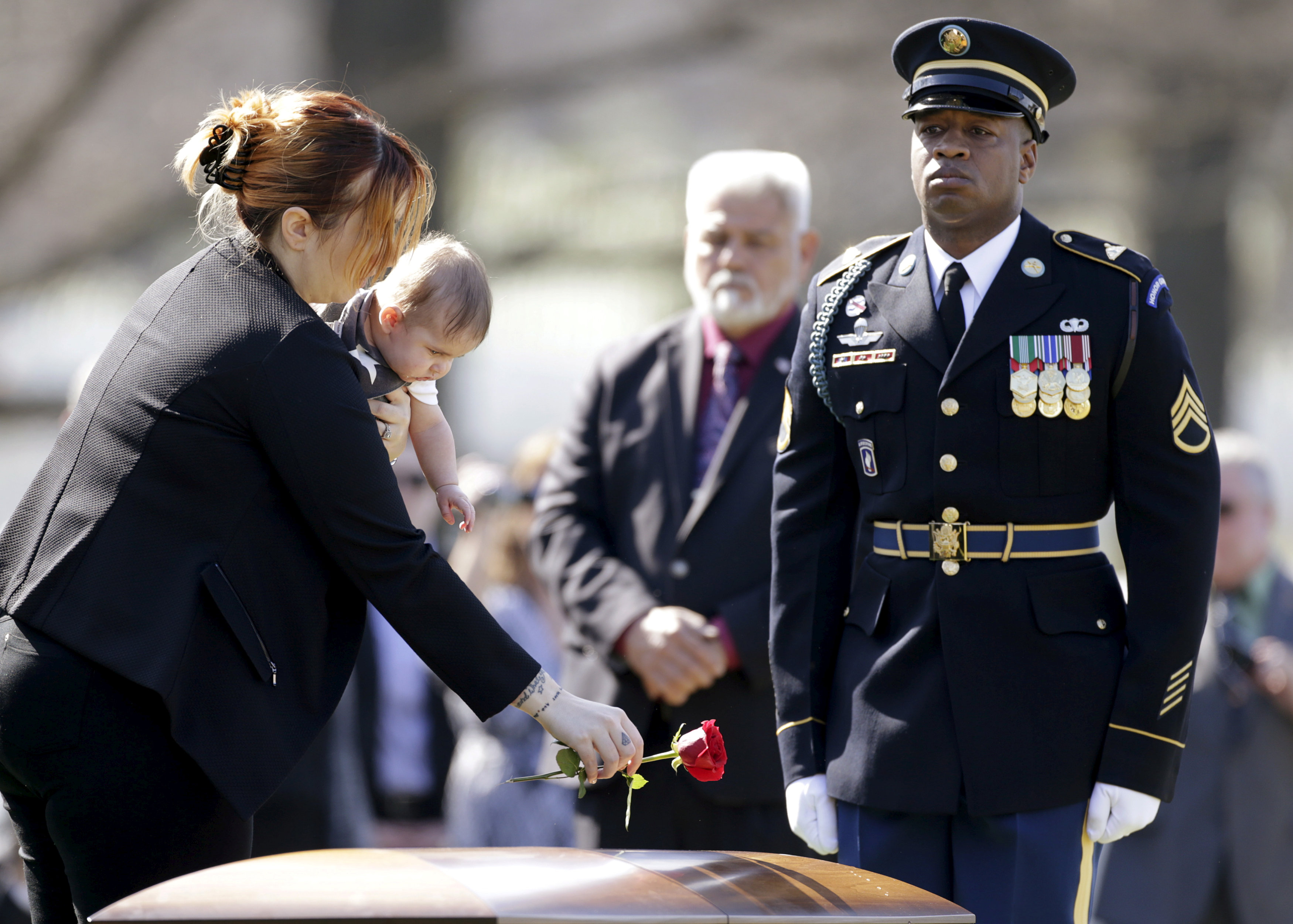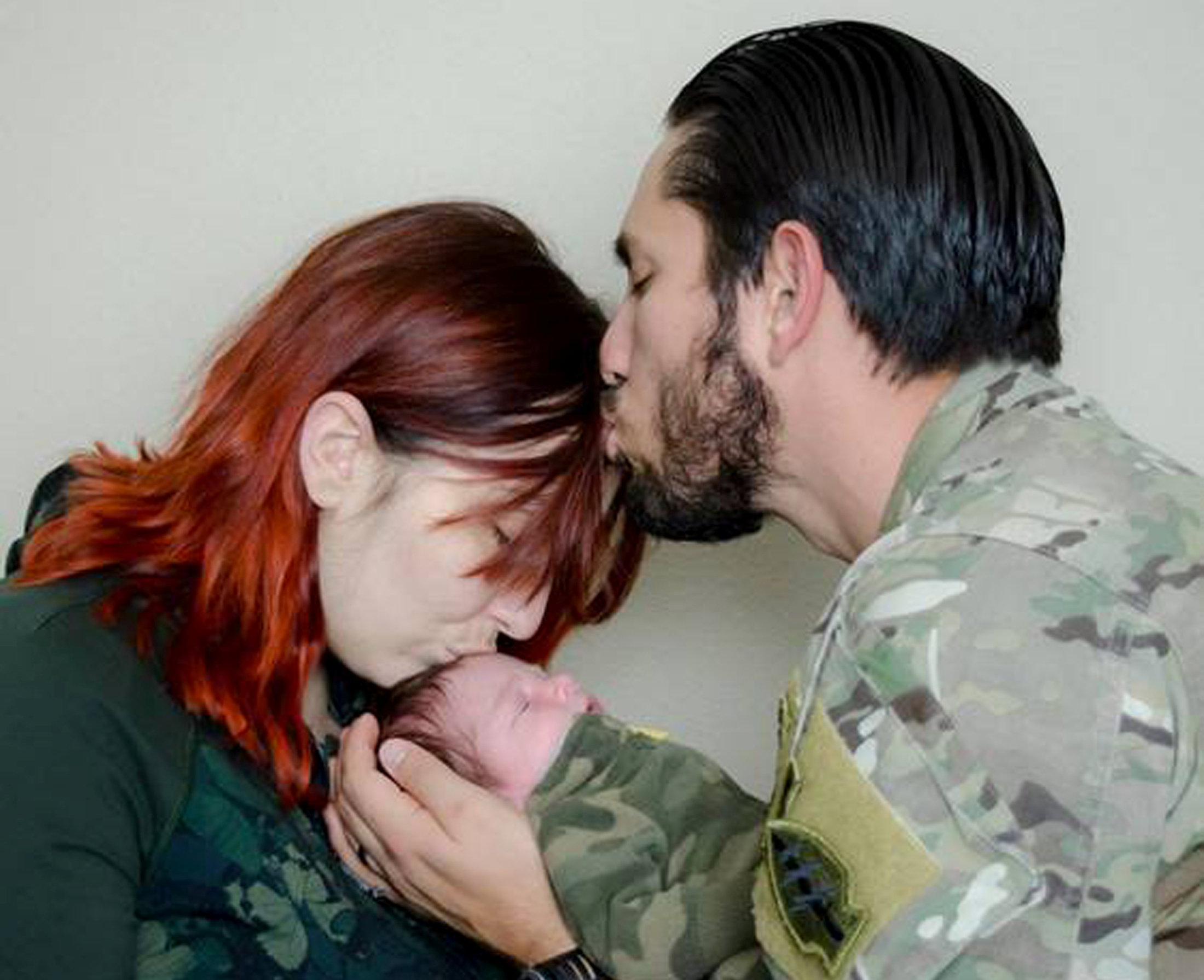
By Idrees Ali
WASHINGTON (Reuters) – On a cold morning in January, Alexandra McClintock shoved her bare hands into the pockets of her black jacket and gazed at the endless rows of graves in Arlington National Cemetery, just across the Potomac River from Washington D.C.
Taking her hands out of her pockets and falling to her knees, she hugged a white marble tombstone as her sobs drowned out the bugle calls from a nearby funeral. Only the sound of her giggling one-and-a-half-year-old son, Declan, forced her to wipe away her tears and loosen her grip on the tombstone.
One year and a day earlier, a Green Beret soldier and chaplain had stood in her living room in Seattle to tell her that her husband, Sergeant First Class Matthew McClintock, 30, was killed in a firefight with Taliban militants in southern Afghanistan’s Helmand province.
McClintock was one of more than 900 American and coalition troops killed in Helmand since 2001 — about a quarter of the more than 3,000 deaths in the U.S.-led war in Afghanistan.
Now U.S. President Donald Trump’s administration is contemplating sending more troops to Afghanistan to boost 8,400 others there more than 15 years after the Islamist Taliban government was toppled. A decision is expected within weeks.
Current and former U.S. officials say that plans being discussed call for sending 3,000-5,000 more troops into what has become America’s longest war.
Some relatives of the U.S. dead ask whether their loved ones have died in vain, particularly as U.S. administrations are reluctant to commit a large amount of resources to a conflict that is often forgotten.
“I feel like my husband’s death is being dismissed and like my husband died for nothing,” Alexandra told Reuters.
“We need to finish the job instead of just continuing to just barely get up to the line… we need to make my husband’s death mean something,” she said.
Some U.S. officials warn that the situation in Afghanistan is worse than they had expected and question the benefit of sending more troops there. Any politically palatable number of additional U.S. and allied forces — like the size of the deployment being considered by the Trump administration — would not be enough to turn the tide, much less create stability and security, the officials say.
Trump is likely to be sucked deeper into the war, which began when former President George W. Bush ordered the invasion of Afghanistan after the Sept. 11, 2001 attacks.
Former President Barack Obama sought to pull out the remaining U.S. troops by the end of his tenure, but left thousands there to train and assist Afghan forces.

FILE PHOTO: Widow Alexandra McClintock (L) holds her son Declan while placing a rose on the casket of her husband U.S. Army Sergeant First Class Matthew McClintock, who was killed in action in Afghanistan in January, at Arlington National Cemetery in Virginia March 7, 2016. REUTERS/Gary Cameron/File Photo
‘BLEEDING ULCER’
Large stretches of Helmand province, source of much of the world’s illegal opium supply, are again in the hands of the Taliban who have steadily pushed back Afghan forces which controlled less than 60 percent of territory earlier this year.
Last month, about 300 U.S. Marines were sent to Helmand, where McClintock was fatally shot in the head during an hours-long gun battle near the town of Marjah.
As far back as 2010, then Army General Stanley McChrystal, the top allied military commander in Afghanistan, referred to Marjah as a “bleeding ulcer”.
McClintock’s last trip home was in October 2015 for Declan’s birth. He stayed a few extra days to help Alexandra deal with her postpartum depression.
“All he wanted to do was hold his son all the time or take pictures of me holding him and he was there for every single second,” McClintock said.
The couple last spoke on Jan 1, 2016 on Skype. He promised he would be home in a month. His last words were: “I love you most.”
Four days later, and just weeks before he was supposed to complete his deployment, McClintock was killed.
Alexandra had just returned from a therapy session when her doorbell rang.
“I remember the sound that came out of me when I collapsed, I remember crawling into my fireplace,” she said.
Two weeks later, she received a package.
It wasn’t addressed to anyone but sat outside her door. In the box was a late Christmas present from McClintock; two shirts that said “momma bear” and “baby bear.”
Resting in a case on a mantle in her living room, Alexandra displays the American flag that was draped over her husband’s casket during his funeral at Arlington Cemetery in March 2016.
What she does not put on display is a letter of condolence she received from Obama which now sits in a drawer. The generic letter, of a type traditionally sent to the relatives of deceased service members, made Alexandra feel “dismissed,” she said.
“My husband died for their war, for this war,” she said, adding that she nevertheless supported the war.
“It doesn’t get easier,” Alexandra said. “I still have dreams where I wake up thinking that Matt is in bed next to me, and I have to remember that he is gone.”
For a graphic on U.S. troop fatalities in Afghanistan, click: http://tmsnrt.rs/2rCletQ
(Reporting by Idrees Ali; Editing by Yara Bayoumy and Alistair Bell)

